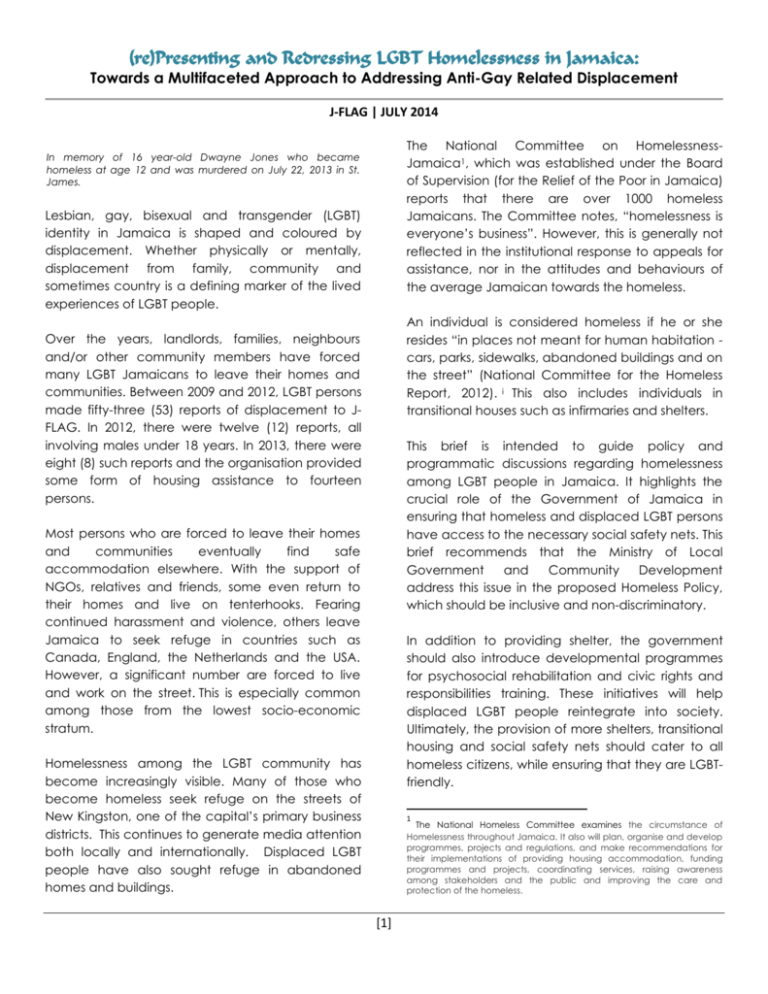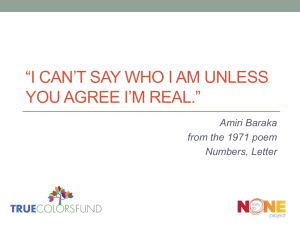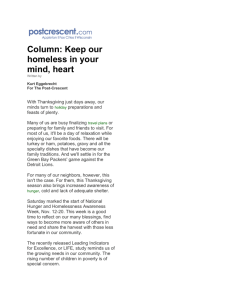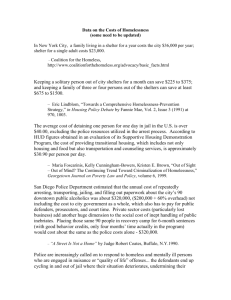
(re)Presenting and Redressing LGBT Homelessness in Jamaica:
Towards a Multifaceted Approach to Addressing Anti-Gay Related Displacement
J-FLAG | JULY 2014
The National Committee on HomelessnessJamaica1, which was established under the Board
of Supervision (for the Relief of the Poor in Jamaica)
reports that there are over 1000 homeless
Jamaicans. The Committee notes, “homelessness is
everyone’s business”. However, this is generally not
reflected in the institutional response to appeals for
assistance, nor in the attitudes and behaviours of
the average Jamaican towards the homeless.
In memory of 16 year-old Dwayne Jones who became
homeless at age 12 and was murdered on July 22, 2013 in St.
James.
Lesbian, gay, bisexual and transgender (LGBT)
identity in Jamaica is shaped and coloured by
displacement. Whether physically or mentally,
displacement from family, community and
sometimes country is a defining marker of the lived
experiences of LGBT people.
An individual is considered homeless if he or she
resides “in places not meant for human habitation cars, parks, sidewalks, abandoned buildings and on
the street” (National Committee for the Homeless
Report, 2012). i This also includes individuals in
transitional houses such as infirmaries and shelters.
Over the years, landlords, families, neighbours
and/or other community members have forced
many LGBT Jamaicans to leave their homes and
communities. Between 2009 and 2012, LGBT persons
made fifty-three (53) reports of displacement to JFLAG. In 2012, there were twelve (12) reports, all
involving males under 18 years. In 2013, there were
eight (8) such reports and the organisation provided
some form of housing assistance to fourteen
persons.
This brief is intended to guide policy and
programmatic discussions regarding homelessness
among LGBT people in Jamaica. It highlights the
crucial role of the Government of Jamaica in
ensuring that homeless and displaced LGBT persons
have access to the necessary social safety nets. This
brief recommends that the Ministry of Local
Government
and
Community
Development
address this issue in the proposed Homeless Policy,
which should be inclusive and non-discriminatory.
Most persons who are forced to leave their homes
and
communities
eventually
find
safe
accommodation elsewhere. With the support of
NGOs, relatives and friends, some even return to
their homes and live on tenterhooks. Fearing
continued harassment and violence, others leave
Jamaica to seek refuge in countries such as
Canada, England, the Netherlands and the USA.
However, a significant number are forced to live
and work on the street. This is especially common
among those from the lowest socio-economic
stratum.
In addition to providing shelter, the government
should also introduce developmental programmes
for psychosocial rehabilitation and civic rights and
responsibilities training. These initiatives will help
displaced LGBT people reintegrate into society.
Ultimately, the provision of more shelters, transitional
housing and social safety nets should cater to all
homeless citizens, while ensuring that they are LGBTfriendly.
Homelessness among the LGBT community has
become increasingly visible. Many of those who
become homeless seek refuge on the streets of
New Kingston, one of the capital’s primary business
districts. This continues to generate media attention
both locally and internationally. Displaced LGBT
people have also sought refuge in abandoned
homes and buildings.
1
The National Homeless Committee examines the circumstance of
Homelessness throughout Jamaica. It also will plan, organise and develop
programmes, projects and regulations, and make recommendations for
their implementations of providing housing accommodation, funding
programmes and projects, coordinating services, raising awareness
among stakeholders and the public and improving the care and
protection of the homeless.
[1]
(re)Presenting and Redressing LGBT Homelessness in Jamaica
Department. Furthermore, there are numerous
homeless persons who do not interact with the Poor
Relief Department or its affiliated agencies. As a
result, data from the Poor Relief Department do not
provide an accurate or comprehensive report on
homelessness in Jamaica.
Overview: Homelessness in Jamaica
Homelessness has been a chronic problem in
Jamaica since Hurricane Gilbert in 1988. The
National Committee on Homelessness marks the
aftermath of this hurricane as one of the main
events that led to the development of deep-seated
homelessness in Jamaica (National Committee on
Homelessness, Report 2012). According to this report
there are at least 1,160 persons who are homeless
island-wide. The majority—a total of 616 persons—
reside in the parishes of Kingston and St. Andrew. St.
James - the second city and one of the major tourist
areas - has a total of 138 homeless people (see
Figure 1).
Based on reports from J-FLAG, between thirty (30)
and sixty (60) LGBT homeless persons frequent the
New Kingston area. There are additional
communities of LGBT persons known to be homeless
in Kingston & St Andrew and St James.
If accurate information is not provided on
homelessness in Jamaica, future policies and
programmes geared towards assisting the homeless
might be inadequate or misdirected. This brief
recommends that a population survey be
conducted in Jamaica to ascertain the number of
homeless persons, as well as those who live and
work on the streets and in temporary places of
shelter. In addition, it is important that this
population survey accounts for those who are
socially displaced as a result of their sexual
orientation and gender non-conforming expression.
Street People Population
Islandwide
King & St. Andrew
St. Thomas
Portland
St. Mary
St. Ann
Trelawny
St. James
Hanover
Westmoreland
St. Elizabeth
Manchester
Clarendon
St. Catherine
700 616
600
500
400
300
138
200
68
44 25 49 40 72 34
36
100
18
10
9
0
Contextualizing Homelessness: LGBT Persons
People become homeless for a variety of
reasons. These include, but are not limited to crime
and violence, health status (including HIV, AIDS, or
mental illness), family problems, eviction, drug use,
poverty, and unemployment (National Committee
on Homelessness, 2012)ii.
Figure 1-Homeless Population by Parish
Included in this statistic are LGBT persons who are
homeless. Though LGBT individuals might have been
included in this survey, it did not directly measure
homelessness among LGBT people. As a result, this
brief could not measure the extent of homelessness
in the LGBT community.
Reports made to J-FLAG indicate that homelessness
among LGBT persons is almost always the result of
discrimination or violence. This is largely based on
negative beliefs about the sexual orientation of
LGBT persons. An antiquated “buggery law” as well
as a deep-rooted culture of heteronormativity and
homo-negativity among many Jamaicans fuel this
discrimination. As a consequence, LGBT people
such as Dwayne Jones have been forced to leave
their homes and communities, families, friends, and
loved ones and seek refuge on the streets. With the
support of organisations such as J-FLAG, as well as
Limitation of Data
There is an urgent need to collect comprehensive
data on homelessness in Jamaica. The information
provided above (in Figure 1) only contains incidents
of homelessness known to the Poor Relief
[2]
WWW.JFLAG.ORG | ADMIN@JFLAG.ORG
(re)Presenting and Redressing LGBT Homelessness in Jamaica
relatives and friends, some homeless LGBT persons
eventually find safe accommodation elsewhere or
return to their homes. Others leave Jamaica to seek
asylum abroad. However, some are forced to
remain on the streets or find shelter in abandoned or
unused buildings.
form of care from government, private sector
and/or NGOs (see Figure 2).
Homeless Persons not
Receiving Care
250
Displacement among the LGBT community is
increasingly common as a result of discrimination.
For example, one young man tried to return to his
community in Maxfield Avenue after being
ostracized but was chased by an angry mob that
forced him to leave the communityiii. Incidents such
as this have resulted in a number of LGBT people
being displaced and made homeless in Kingston &
St. Andrew and other parishes.
204
200
150
89
100
50
28
5
31
1
19 27 16
0
The issue of homelessness among LGBT persons is
often regarded as a ‘gay issue’ or a sexual identity
issue occurring in isolation, and not within the
broader national context. The disproportionate
visibility of LGBT persons who are homeless
encourages this perception. Numerous complaints
have reflected disgust at homeless persons who are
open about their sexuality and gender identity.
LGBT persons who are homeless have been
characterised as 'uncontrollable', 'vulgar', 'wreaking
havoc', and a menace to society. In particular
property and business owners claim that their
presence results in a devaluation of property and a
decline in business activity.
Figure 2: Homeless individuals without care
The majority of persons - in excess of two hundred not receiving care and support are in the parishes
of Kingston and St. Andrew. Included among this
number are homeless LGBT people who have no
access to shelter and other facilities.
Government programmes targeting people who
become homeless as a result of mental illness,
substance use, HIV and AIDS are available
(National Committee for the Homeless, Report
2012)iv. However, no such programmes exist for LGBT
persons who have been made homeless as a result
of sexuality or gender identity-based discrimination.
Organisations providing, or have provided one or
more services in this regard include the National
Council on Drug Abuse (NCDA), Open Arms Drop-in
Centre, Dwayne’s House, Colour Pink Group, JFLAG, Jamaica AIDS Support for Life (JASL) and the
Sex Workers’ Association of Jamaica (SWAJ).
What is Being Done by Stakeholders
People who are homeless are generally cared for
through
programmes
from
civil
society
organisations, including faith-based organisations
and by local government. However, the services
provided may be insufficient relative to the total
number of homeless persons known by the Poor
Relief Department.
The Ministry of Local Government and Community
Development has completed preliminary work on a
Homelessness Policy, but has not developed it into
a policy document.
The National Homeless Report (2012) indicates that
of the 1,160 homeless persons reported by the Poor
Relief Department, over 400 do not receive any
[3]
WWW.JFLAG.ORG | ADMIN@JFLAG.ORG
(re)Presenting and Redressing LGBT Homelessness in Jamaica
J-FLAG recommends that
1. Research be conducted to ascertain the
homeless population in Jamaica.
2. A Drop-in Centre be established for persons
who are homeless. This would provide
rehabilitation, personal hygiene care, food
and access to healthcare services.
3. A Night Shelter should be created. This would
provide a place to sleep at night and shelter
in times of natural disasters such as a
hurricane.
4. Housing in the form of a shelter for persons
who are homeless be created; this would
provide individuals with a place to reside.
5. The
Government
develops
a
nondiscriminatory policy for the management of
all forms of shelter provided by the State.
6. The government introduce developmental
programmes for psychosocial rehabilitation
and civic rights and responsibilities training
for persons who are homeless.
J-FLAG is therefore urging the government to
implement
an
inclusive,
non-discriminatory
programme for all persons who are homeless
including LGBT. J-FLAG has tried numerous
interventions to assist displaced members of the
LGBT community. These include helping to
reintegrate homeless persons into their families and
communities, assisting with temporary shelter and
providing other psychosocial services. However, JFLAG has limited capacity to provide for the
number of displaced within the community. JASL
has also provided extensive services to homeless
LGBT persons. An NCDA programme entitled ‘Tek it
to Dem’ has provided services in the form of HIV
and AIDS treatment for homeless persons, including
LGBT people.
Recent Commitment for Homeless LGBT
In a newspaper article published June 13, 2014,
Member of Parliament for South East St. Andrew
and State Minister in the Ministry of Science,
Technology, Energy and Mining, Hon. Julian
Robinson said there was a need to help homeless
gays in his constituency as they have gained
national and international attention.
National Committee on the Homeless Report (2012) Prepared by Ministry
of Local Government and Community Service
ii National Committee on the Homeless Report (2012) Prepared by Ministry
of Local Government and Community Service
iii 'Don't come back here' - Maxfield residents warn gay man after
publicised eviction. http://jamaicastar.com/thestar/20130705/news/news2.html
iv Jamaica Observer June 14, 2014 MP Wants help for New Kingston
Homeless Gays. http://www.jamaicaobserver.com/news/MP-wants-helpfor-New-Kingston-homeless-gays_16879080
v Jamaica Observer June 27, 2014. More Gov’t Funding to Assist the
Homeless. http://www.jamaicaobserver.com/news/More-govt-funding-toassist-the-homeless-_17025680
i
The Government of Jamaica has increased its
budgetary support for homeless programmes for all
local authorities from $16 million to $21 millionv. This
increase in funding could be used to implement
programmes targeted at homeless LGBT people, as
this is a matter of urgency. J-FLAG implores Minister
Julian Robinson and local authorities to use this
funding to develop programmes that will address
this issue in his constituency, where a large number
of homeless LGBT persons have taken refuge.
J-FLAG is the foremost organisation in Jamaica
advocating for the rights of lesbian, gay, bisexual and
transgender (LGBT) people, in an effort to build a
Jamaican society that respects and protects the rights of
everyone.
© J-FLAG 2014
[4]
WWW.JFLAG.ORG | ADMIN@JFLAG.ORG







